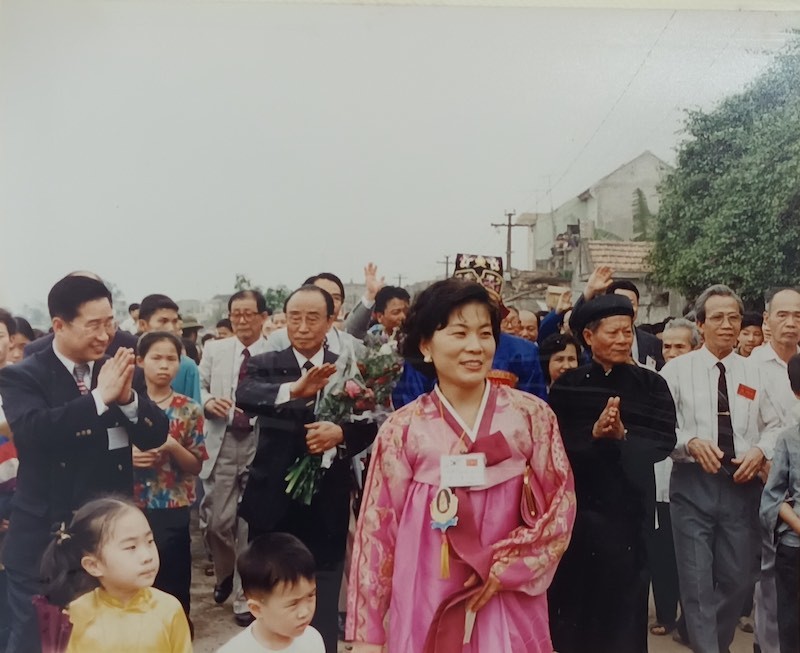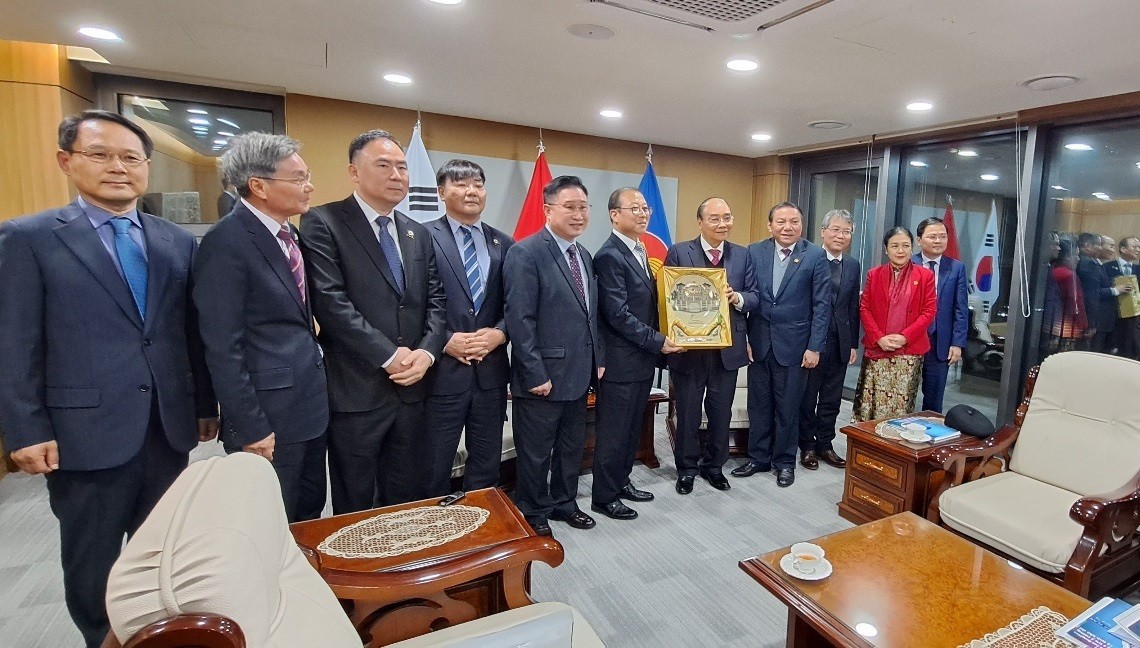Ly Xuong Can, whose Korean name is Lee Chang Kun, was born in 1958 in Seoul (Korea) with an ancient, royal identity. Lee’s ancestors are King Ly Thai To ( the first ruler of the Ly dynasty (1009–1225 of Dai Viet (modern Vietnam)) and Prince Ly Long Tuong (a prince of the Ly dynasty, later became Lee Yong-sang of Hwasan, a general of Korea) of Dai Viet.
About his royal ancestor, Lee claimed that he is always proud of where he came from and has been trying to keep him and other people in his family to stay connected with their Vietnamese roots.
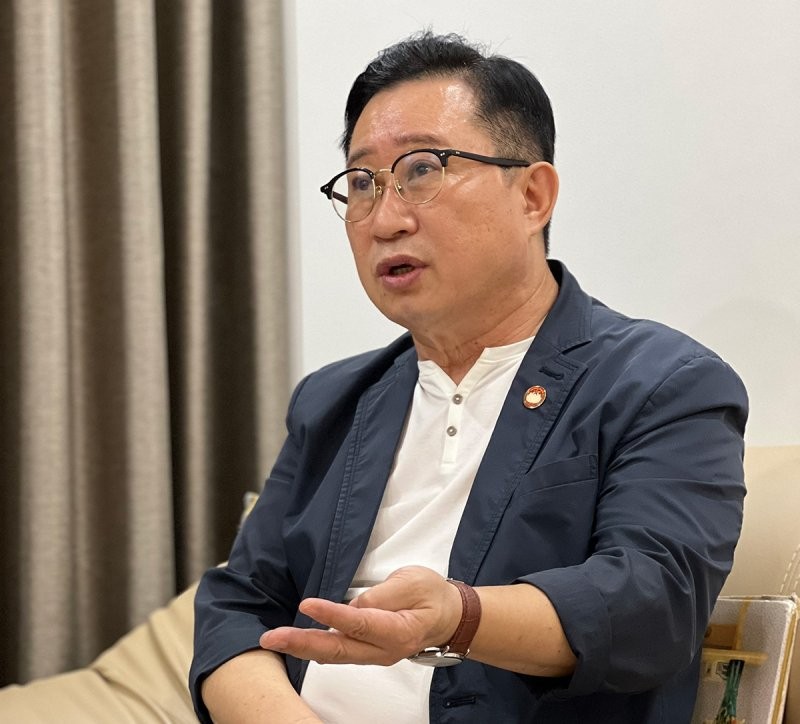 |
| “In 1994, our (Lee’s and his family’s) first trip back to Den Do (Bac Ninh) has drastically changed our family’s life in Korea. We soon get Vietnamese citizenship, living and doing business here until now. It is my honor to be Vietnam’s tourism ambassador in Korea for the second term…” said Lee, emphasizing the milestones in his life with big influences of both Vietnamese and Korean cultures (Photo courtesy of Lee Chang-kun). |
On the occassion of the 30th founding anniverasy of Vietnam-Korea diplomatic relation, Lee spoke with Vietnam Times about his way to honor his royal ancestors and what is it like being Vietnam’s tourism ambassador to Korea for 2017-2020 and 2021-2024 term.
Yearning toward the homeland after 8 centuries
How have your and your family’s life changed after nearly 30 years in Vietnam?
After my inital visit to the homeland in 1994, my family and I decided to move to Vietnam since the early 2000. At first, my children were worried about the language barrier so they faced some difficulties in communication. However, after a short time in Vietnam, my family members gradually adapted to the new environment. My children can learn and talk to many Vietnamese.
My eldest child was born in 1989, the second one was born in 1991 and the youngest one was born in 1998. All of my children studied at the Experimental School of Education Science (Hanoi) when they were little.
On the 1000th anniversary of Thang Long – Hanoi in 2010, my family naturalized in Vietnam. My second son went to University of Economics (Vietnam National University in Hanoi) and is currently working for a Korean real estate company in Da Nang. I feel satisfied with our life in Vietnam.
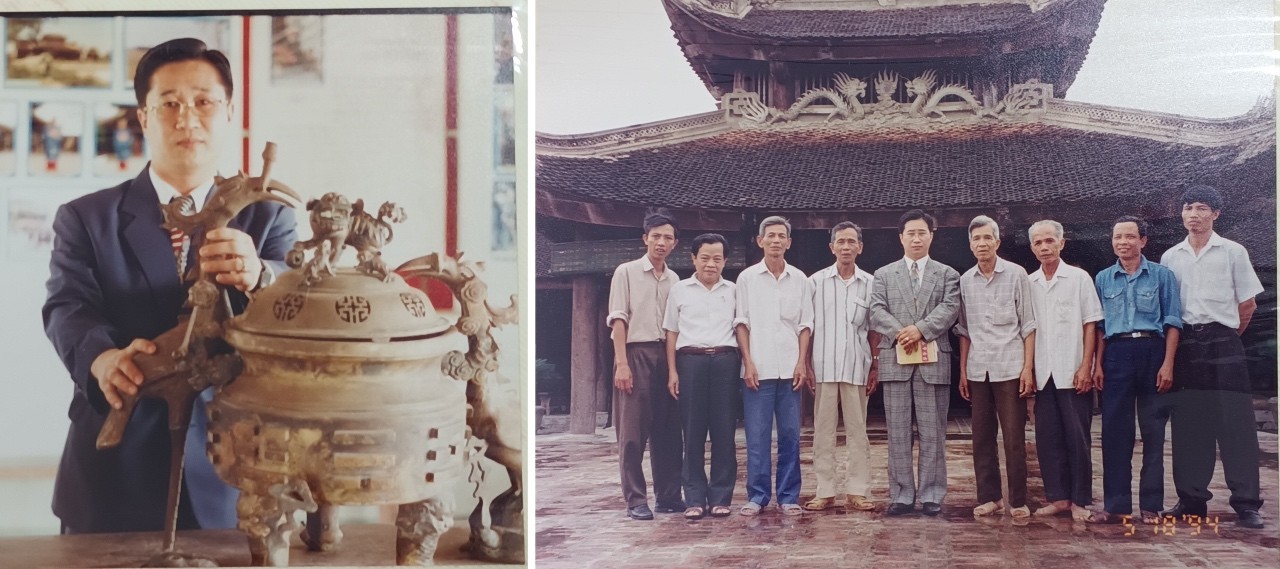 |
|
Lee Chang-kun (left) on his trip visiting Do Temple (Bac Ninh) in 1994. (Photo courtesy of Lee Chang-kun). |
Not only did you return to Vietnam, you also established a business here. What kind of challenges did you have to overcome in building your business?
In the 2000s when I moved to Vietnam, I decided to invest in environment-related companies in Quang Nam and Da Nang. At that time, my family also moved from Quang Nam to Da Nang. The company had about 50 local workers and operated in the field of environment in Quang Nam.
At first I was not fluent in Vietnamese yet, so our activities were difficult due to language differences, let alone our confusion when doing business in a new location.
There were times when I felt like giving up. However at those times, my Vietnamese blood helped me to make better efforts to rise up. In addition, I am fortunate to have clever employees who helped me to overcome difficulties.
According to Lee Chang-kun, when his ancestor, Prince Ly Long Tuong, first came to Goryeo (modern North Korea and South Korea), he lived in Hwasan region. The king of Goryeo also crowned Prince Ly Long Tuong the title Hwasan General. That is how Hwasan clan (Vietnamese name: Ly Hoa Son clan) got its name. There are currently about 250 families in the Hwasan clan, with an estimated population of 1800-1900,” said Lee. |
Since the year 1994 when you first arrived in Vietnam until now, how has you contributed to helping members of the Hwasan clan stay connected with Vietnam, their homeland?
The 15th day of the 3rd lunar calendar every year is the celebration of Ly Cong Uan’s accession to the throne (King Ly Thai To’s real name). The Hwasan clan often sends a delegation of 15 people to Vietnam to attend the ceremony. In the past 2 years, the Covid-19 pandemic has greatly affected travel, so the family sent only 4-5 representatives to visit the homeland. In Korea, once a year or on Tet holidays, the family holds a meeting to exchange information about the homeland, about the development and innovation of Vietnam.
And in 1967 in South Korea, a historical novel about Prince Ly Long Tuong was published. In 1995, the novel was translated into Vietnamese so that more Vietnamese people better understand the history and the predestined relationship between the two countries.
The book has been reprinted many times in Vietnam. In its second edition (2010), Prof. Phan Huy Le – Chairman of the Vietnam Association of History Science and Park Sukhwan – Ambassador Extraordinary and Plenipotentiary of the Republic of Korea to Vietnam wrote the introduction.
I also launched a Youtube channel to talk about the story of Prince Ly Long Tuong. In South Korea, there was also an Association about Prince Ly Long Tuong. The association was established to help the descendants of the Hwasan clan learn and promote the family history and the origin of Prince Ly Long Tuong.
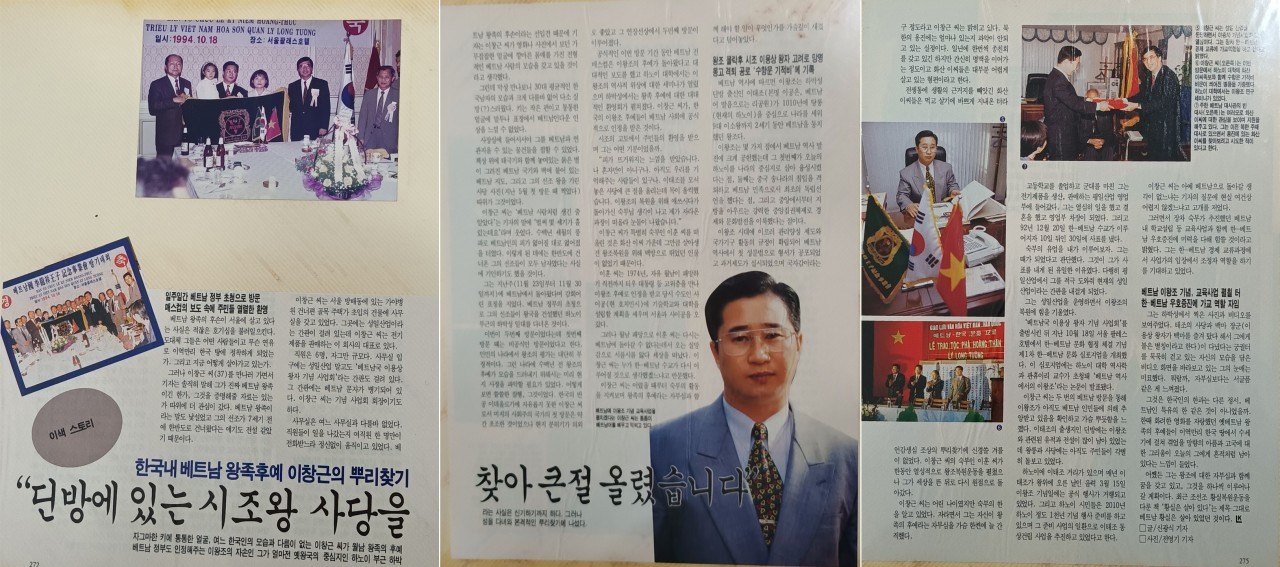 |
|
Korean’s newspaper about the story of Prince Ly Long Tuong and Lee Chan-kun’s return trip to Vietnam (Photo courtesy of Lee Chang-kun). |
Bridging the two countries through tourism
How did you become Vietnam’s tourism ambassador in Korea under the Ministry of Culture, Sports and Tourism?
In 2016, with the desire to contribute to Vietnam’s tourism sector, I proposed to the Ministry of Culture, Sports and Tourism of Vietnam to appoint me as Vietnam’s tourism ambassador in South Korea. At that time, attracting tourists and investment from South Korea was very important. I understood South Korea and types of Korean tours very well.
Upon my proposal, the Ministry of Culture, Sports and Tourism of Vietnam held an appraisal council of 10 people. The evaluation process showed that I had all the suitable qualities for the position. On that basis, the Ministry supported and appointed me as Vietnam Tourism Ambassador for the first term in 2017.
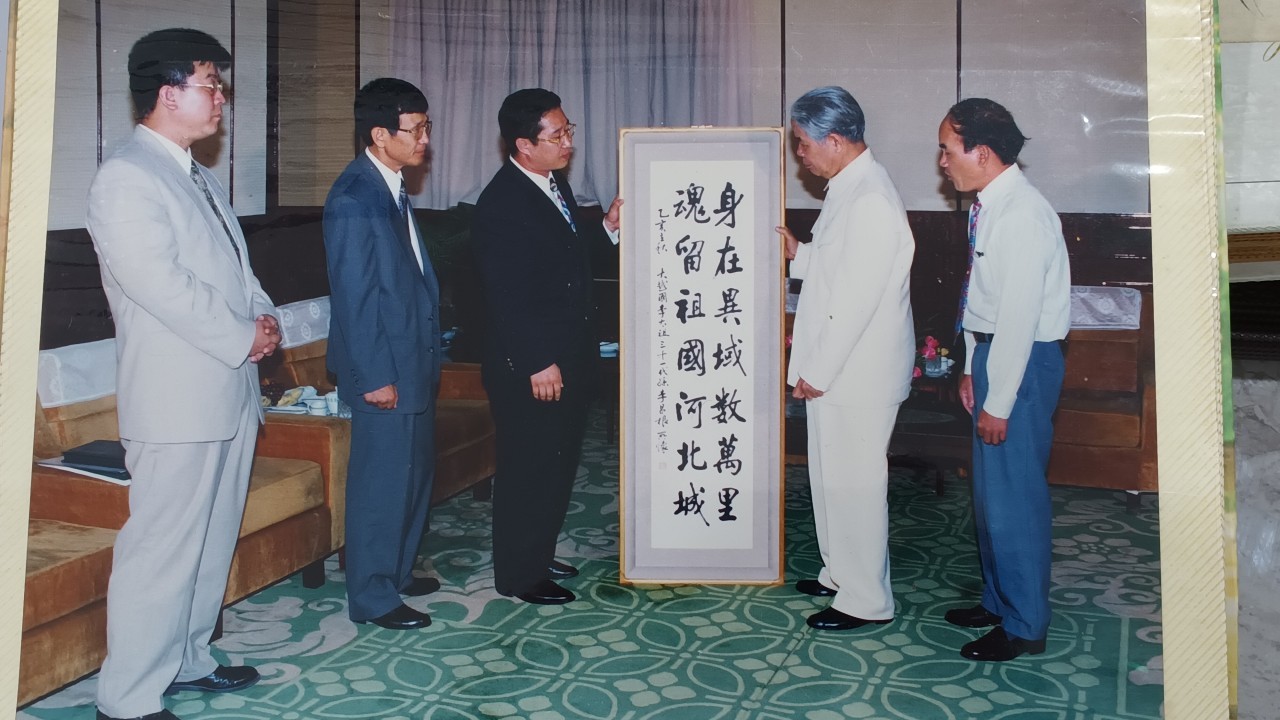 |
|
Lee Chang-kun presented a calligraphy letter to the leaders of the Parties in Vietnam (Photo courtesy of Lee Chang-kun). |
You have been serving as Vietnam’s tourism ambassador to Korea for the second term, 2021-2024. In your opinion, what are the most outstanding results in connecting tourism between Vietnam and South Korea?
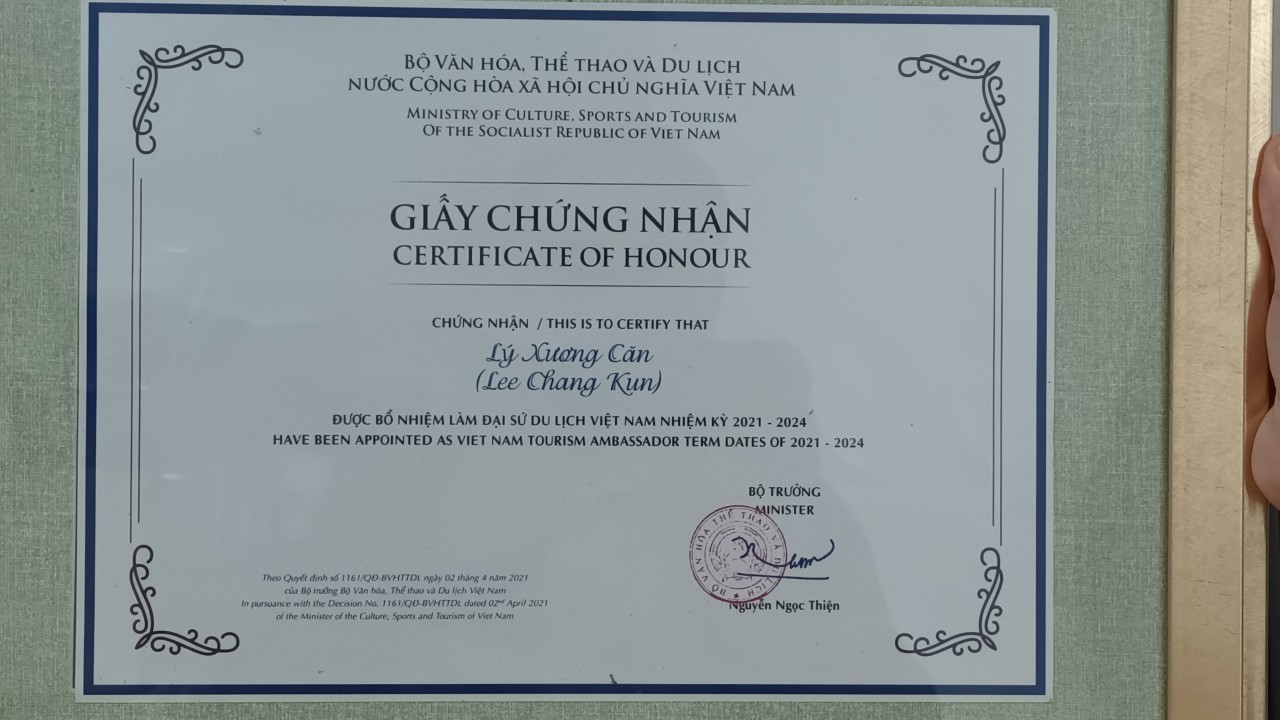 |
| Certificate of Honor of Lee Chang-kun as Vietnam Tourism Ambassador for the term 2021-2024 (Photo courtesy of Lee Chang-kun). |
In my first term (2017-2020), I carried out programs and events to introduce Vietnam to Korean tourists with the slogan “closer, friendlier” that was held in South Korea twice a year.
In 2019, more than 4.3 million Korean tourists visited Vietnam.
The target in 2020 was to reach 5 million, but unfortunately due to the Covid-19 pandemic, the plans were interrupted and had to be stopped.
However, I believe there will more advantages in the upcoming time to finally realize this goal
Vietnam and Korea are looking forward to take the relationship to the next level and to become comprehensive strategic partnership. In your opinion, what are the investment opportunities for developing the relationship between the two countries, especially in the tourism sector?
For the past 3 years, Vietnam-Korea has faced many difficulties due to the impacts of the pandemic. Now, the virus situation is getting better and travelling is easier. Also, 2022 is an important time to celebrate the 30th anniversary of the establishment of diplomatic relationship between the two countries. The recent visit of President Nguyen Xuan Phuc to Korea has had a good impact on that since the exchange content of the leaders of the 2 countries was very positive on many issues and fields.
Also in Korea, President Nguyen Xuan Phuc met with the leaders Korean corporations. Through the economic forum, about 500 Korean economic entrepreneurs nationwide showw theirr interest in Vietnam. The event was widely reported on Korean TV channels, newspapers, and social networking sites. I think that, by the beginning of 2023, the investment and attraction of tourists between the two countries will have a clear, positive change.
Aiming for a closer partnership
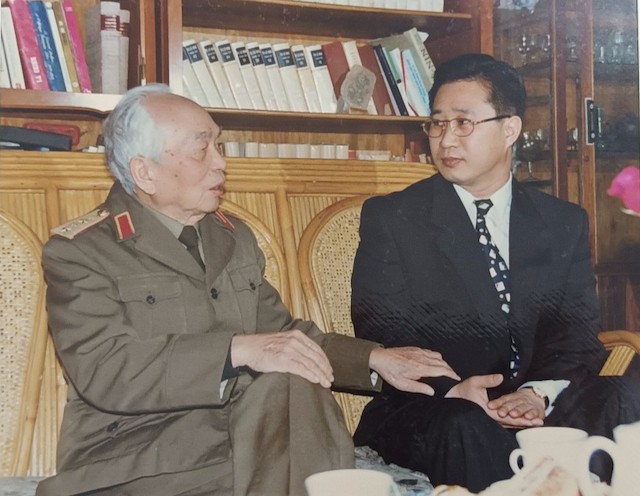 |
|
Lee Chang-kun (right) met with General Vo Nguyen Giap (Photo courtesy of Lee Chang-kun). |
In your position as the Vietnam’s tourism ambassador to Korea, what are the most focused issues at the moment?
I have established the Vietnam Tourism Promotion Office in Korea in 2019, based on an internal contract between the Tourism Ambassador and the Vietnam National Administration of Tourism. And my position as Vietnam’s tourism ambassador to Korea is well-recognized by the South Korean side, by government agencies and by the local people.
However, the Office has not been licensed by the Korean Government, so it is not yet recognized as an organizational agency of the Vietnamese government. It would require better administrative assistance fro the Korean Government so that the Offive can be officially registered.
To better promote Vietnam’s tourism activities in Korea, I think it is necessary to establish a Vietnam Cultural and Tourism Center in Korea as soon as possible. It is also a need for tourism development funds, and they can come from many sources and forms of support for promotion activities.
“During President Nguyen Xuan Phuc’s recent official visit to Korea, he spent an afternoon meeting with the Hwasan clan at the Vietnamese embassy in Korea. The President has encouraged the the Hwasan’s people should make time to return to Vietnam, especially on special holidays like Lunar New Year. He said that the Hwasan clan is the Vietnam-Korea bridge that connect the two countries to move toward better development,” said Lee. |
Do you have any suggestions for improving Vietnam-Korea cooperation in the tourism sector?
I noticed that in Asia, many countries invest a lot of money and effort to attract Korean investors and tourists. After the outbreak of Covid-19, Korean tourist’s behaviors and travel trends have changed and the competition is also increasingly fierce. Vietnam must do a lot of research to find a new approach to the Korean tourism market to bring effectiveness in promoting the image of the country and people of Vietnam.
I am are trying my best to help improve Vietnam-Korea cooperation in the tourism sector. But just one individual is not enough to create competitive advantage for Vietnam as a tourism destination. We need active support from the people, and from relevant ministries and agencies.
Bach Ma Temple – One of four sacred guarding temples of Hanoi
Bach Ma Temple, located at 76 Hang Buom Street in the Old Quarter of Hanoi, is the oldest temple in the capital city.

